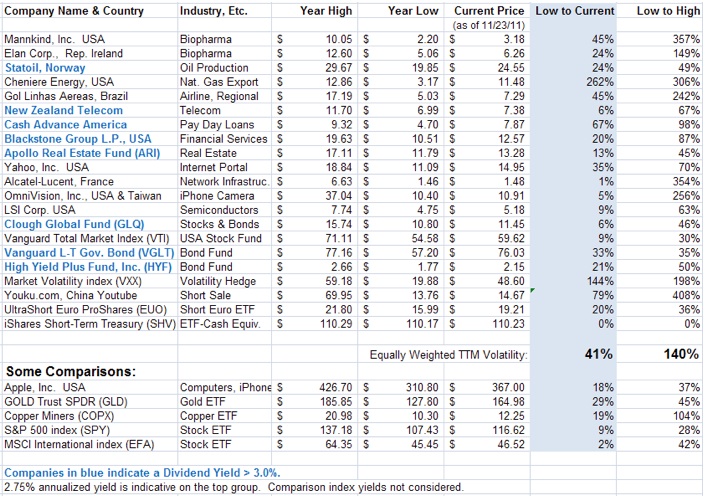 Manager: Mark Holder
Manager: Mark Holder
Model: Opportunistic Arbitrage
Disclosure: Long PUDA, LIWA, NUVA, RIGL, SVNT, AER, LIZ, X, LLNW as of time of writing
This model had a difficult month in April as it underperformed the S&P 500 by a disappointing margin: down 1.6% versus a 2.85% gain for the index.
The model was hit very hard from concerns over Chinese stocks, specifically the fraud allegation against Puda Coal (NYSE: PUDA). PUDA contributed a considerable amount to the portfolio’s underperformance, along with the other Chinese stocks in the model. Most other stocks and sectors performed well in April.
China
Concerns abounded over Chinese reverse mergers, including the two such stocks held in the model: PUDA and Lihua International (NASDAQ: LIWA). Allegations surfaced (see my blog post) during the month that led to a huge decline in the stock price of PUDA, and trading in the stock was halted.
An investigation on the supposed illegal transfer of ownership by the Chairman is ongoing. In the meantime, the Chairman has proposed a buyout at $12 or 100% above the halted price. This price matches the recent secondary offering and roughly equals the price prior to the fraud reports.
While this offer solidifies our opinion that PUDA shareholders still maintain significant value and could be made whole, no guarantee exists that the buyout will be completed. Our opinion remains that PUDA has a value north of the buyout offer and the potential exists that the investigations surrounding the fraud could help remove any questions surrounding the stock, once resolved. Naturally, this assumes shareholders don’t lose a large ownership position in the company in the process.
LIWA lost over 8% in the month mostly due to the fraud fears that pushed all such stocks down. The company continues to report solid growth and earnings in addition to starting a stock buyback program that hopefully helps support the stock. China Cache International was also down roughly 8% and though this was a legitimate IPO, it hasn’t kept the share from feeling the downside pressure as well. (Source: Yahoo Finance)
Trades
Trading was limited this month to the selling of Cephalon (NASDAQ: CEPH) and the purchase of NuVasive (NASDAQ: NUVA) in order to maintain exposure to the healthcare sector.
At the time of the sale, CEPH was trading above the offering price of a buyout – hence the decision to the sell the stock. Since then, they’ve had a higher offer from Teva Pharma (NASDAQ: TEVA), but even that upside didn’t justify the risk of holding the stock.
In addition, NUVA was up sharply in April, with plenty of remaining upside. I believe this demonstrates that the risk/return ratio favored the switch, even if the model didn’t catch the highest bid in the CEPH buyout.
Top Performers
The model had numerous big winner this month, but unfortunately they were all overshadowed by the PUDA losses. The main gainers were in the healthcare sector with Rigel Pharma (NASDAQ: RIGL), NUVA, and Savient Pharma (NASDAQ: SVNT) up sharply. They mainly benefited from a shift to the underperforming sector as emerging markets struggled.
Other gainers were AerCap Holdings (NYSE: AER) and Liz Claiborne (NYSE: LIZ). Though LIZ struggled during Q1 it is becoming more apparent that they might have finally turned the corner. They’ve struggled for a couple of years to turn popular brands like Lucky Brands, Juicy Couture, and kate spade around, and it might finally have taken hold especially as we go into the fall.
Bottom Performers
In addition to the China disasters, United States Steel (NYSE: X) and Limelight Networks (NASDAQ: LLNW) both fell hard. X had disappointing earnings yet again, but could finally hit the sweet spot with Q2 earnings. I believe the stock offers excellent upside potential as global growth continues.
LLNW got hit from competitors Akamai’s (NASDAQ: AKAM) weak report. Considering the content delivery network (CDN) sector remains under immense margin pressure and the company is still losing money, the position was exited in early May.
Conclusion
The model remains under extreme volatility even though a majority of the companies have attractive valuations. The fear in China appears greatly overblown and provides some attractive investment opportunities, either via commodity stocks or China based companies.
Sources:
“Puda Coal gets buy-out proposal from chairman” Reuters, 4/29/11 https://www.reuters.com/article/pudacoal/update-1-puda-coal-gets-buy-out-proposal-from-chairman-idUSL3E7FT3EX20110429

